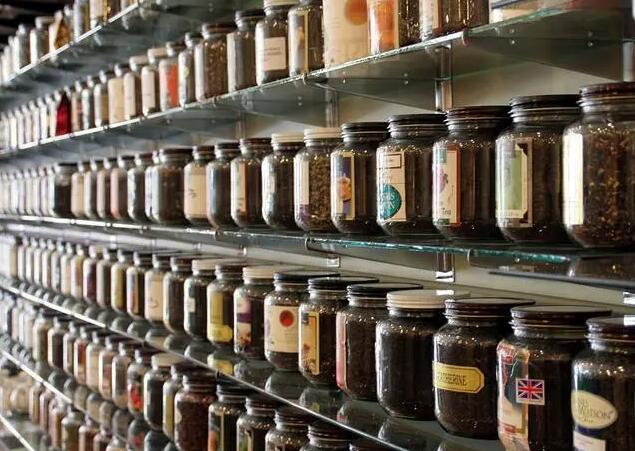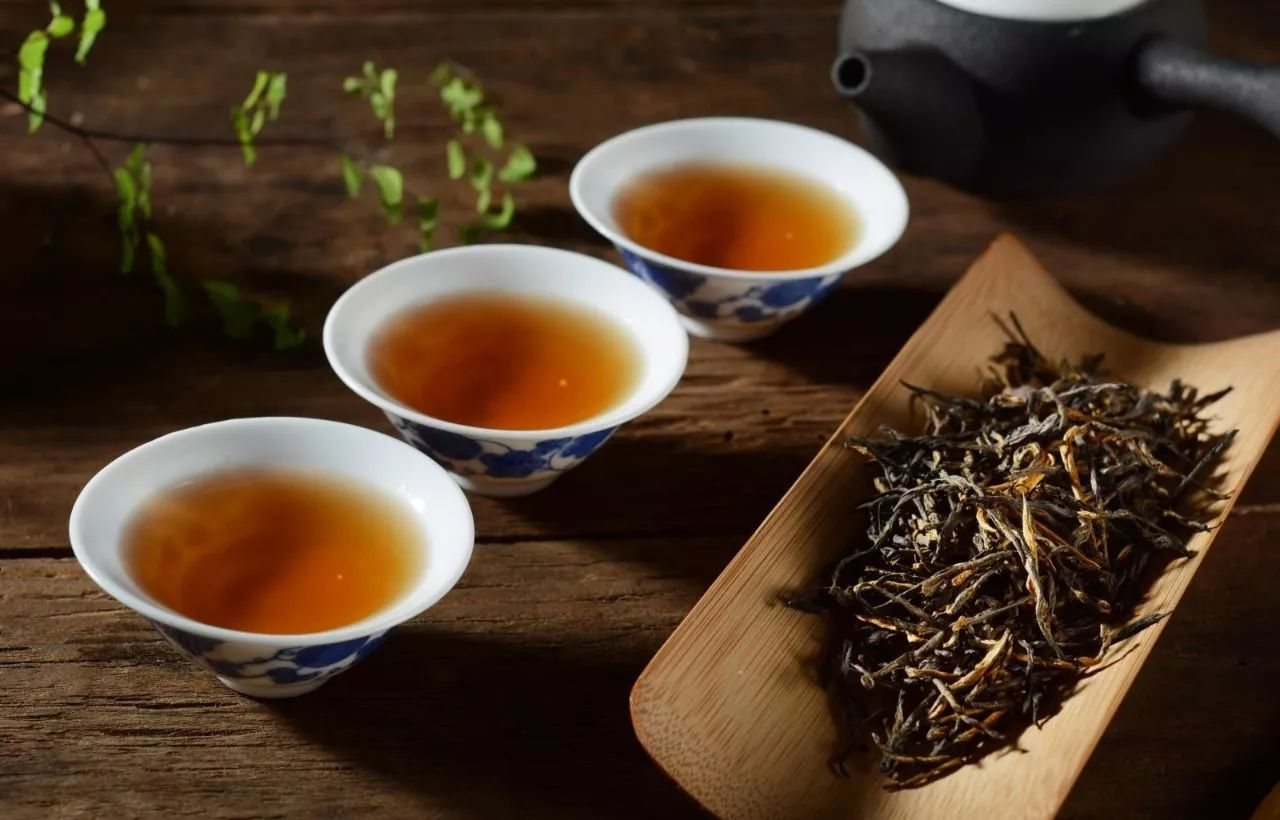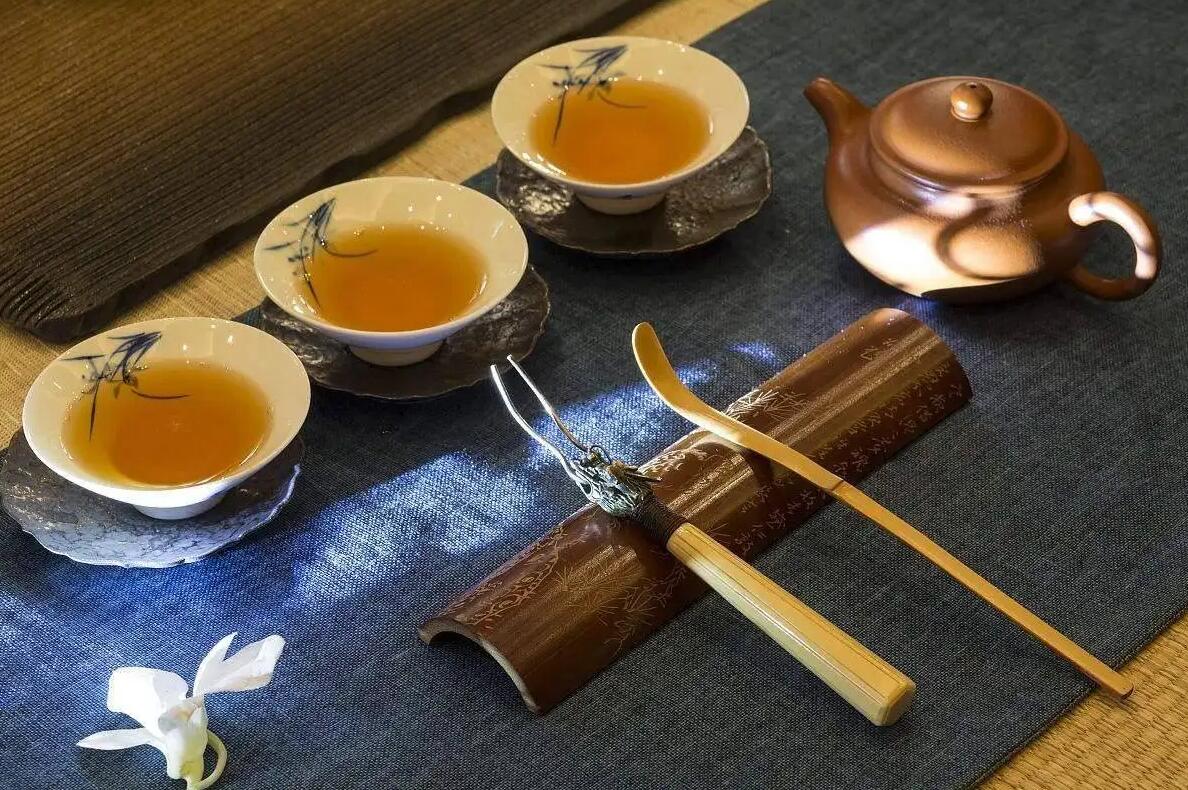Chinese proverb goes like this - the first seven things a day are firewood, rice, oil, salt, catsup, vinegar and tea. Tea is an indispensable part in the life of Chinese people. The first six of the seven things are used either as fuel or condiment for cookings having something to do with feeding people. Tea is the only drink. Although it ranks last in the first seven things, it occupies a special position.
Tea and Marriage
In chapter 25 of Red Mansion Dream, Wang Xifeng sends Lin Daiyu two bottles of tea leaves and joked, "You've drunk tine tea of our family, how come you are still not the daughter-in-law of our family?" What brought tea and marriage together?
Ancient Chinese considered marriage as the origin of all ceremonies. Zhou Yi - the classic book of Confucianism - said, "sky and earth give birth to all beings, all beings give rise to couples, couples give rise to fathers and sons, fathers and sons give rise to kings and ministers, kings and ministers give rise to the order of high and low, and high and low give rise to mistakes in ceremony." Marriage is regarded as the foot stone of the entire moral system, so the durability and stability of marriage has been considerably stressed, as is said in "the principle of marriage is eternity as opposed to ephemerality." From courtship to wedding, certain rules and formalities have to be observed and certain gifts have to be presented, This not only shows respect to marriage, but implies people's good wish to the future married life.
In ancient China, a boy going to a girl's family had to bring a wild goose as gift, called "goose foundation." Wild goose is migratory bird that migrates to the south in winter, so ancient people took them as "sun bird." The Chinese character for sun is called Yang, Since men belong to Yang, they expect their future wives to follow them as wild goose following sun. This obedience is called "husband sings and wife follows, "suggesting a perfect domestic harmony. Besides, wild goose is loyal. It doesn't live on alone after its partner dies. People expect couples to be that loyal too and can live and die together. Later, it gets harder and harder to catch wild goose, so people substitute them with home-raised chicken, duck, and goose. With the popularization of tea, it superseded these poultries to be the best gifts for proposing. In a very long time, Chinese people planted tea trees by sowing seeds because they thought tea trees could not be transplanted for fear of dying of drying up. Ancient people expressed through tea their nice wish that their daughter would take root in her husband's family and be loyal all her life, just like a tea tree. If a woman re-married, that was "drinking the tea of two families." That woman was sure to be despised.
In Tang Dynasty, custom went so that tea was treated as betrothal gift. Since Song Dynasty, tea was even more closely related to wedding. Betrothal gift was also "tea and to present betrothal gift was commonly called to "present tea" If a girl accepted the gift, that was "dink tea." To return the gift, fruits were usually chosen, sometimes together with tea, called "order tea." Even today, in the countryside in many parts of China, engagement is still called "accept tea" and the cash gift in engagement is called "tea cash." If both the boy and girl were willing^ they appointed a time to get married. Many guests were invited to attend the wedding, during which tea, wine, music and opera were four necessary ingredients. In Qing Dynasty, the wedding ceremony developed to the systematized ceremony of "Three Tea," namely "present tea" when proposing, "settle tea" in weddings and "join tea" on the first night of marriage* According to Lu You's Notes from Hut of Old Knowledge, in some southern regions at Lu You's time, single boys and girls got together to sing. Boys started with a Bong with "girls are flowers, come for tea sometimes." So tea was a good excuse for a date. In Hunan Province of mid-south China,tea was also the best tool for boys and girls to communicate. When a boy went to a girl's home on a blind date, the girl would serve him tea in person if she was satisfied with him. And the boy would accept the tea if he was also satisfied. The story didn't stop at this. Match making, blind date and bridal night were all accompanied by tea to add some fun. The custom of using tea as a matchmaker was not limited among common folks, either. It even influenced the aristocrats. When a royal man got married in Song Dynasty, he had to present 50 kilos of tea leaves as betrothal gift. The connection between tea and marriage was so intimate that if it's almost "no marriage without tea." Emperor Kangxi (1654-1722) of Qing Dynasty used to send ministers to south China (south of Yangtze river) to choose wives for him. Girls there all hurried to get married to avoid the widow-like life in the imperial palace. Nevertheless, however poor they the boys were and however hurried they were, tea was by no means dispensable.
Even after marriage, tea could not be done without. It played a role of stabilizing family and promoting conjugal emotion. In Ningbo of Zhejiang Province, there was a custom of "tea of new son-in-law When the son-in-law went to his wife's home for the first time after marriage, his parent-in-law would lavishly entertain him with many dishes. Moderate family generally presented tea two or three times, and rich family could present as many as seven or eight times. The girl's family put their expectation for the son-in-law in the tea. Local people believed that even though discords occurred between the couple, as long as the husband remembered how well his parents-in-law once treated him, he would treat his wife kindly.
Not only did people associate the planting of tea trees with loyalty, but poets of past time liked to compare tea to girls as well - Su Shi had a sentence "good tea is always like beautiful woman." Poet Chen Yuyi of Song Dynasty also wrote a sentence "your black skirt and beautiful face look familiar and camellia blooms are all around in September." Because of tea's symbolic as well as practical value in the married life of Chinese people, it has been given enormous recognition and praise. In old China, when you went to another house as a guest, you could not bring tea leaves as gift if the host had a single daughter because that would cause misunderstanding. However, now the Chinese don't need "order of parents and words of matchmaker," but prefer free love, so this function of tea has gradually gone to oblivion.
Tea with Friends
Western people are accustomed to treating guests with coffee while Chinese people prefer tea, "Present tea as wine to a guest arriving on a cold night while water is boiling in the bamboo stove on reddening fire." Host presents a cup of fragrant tea to show his hospitality. Generally, apparatus for guests to drink tea should be clean, and the rule of tea "50% full and wine 100% full" should be observed when serving tea, Because hot tea tastes better, and it will get cooler if the guest cannot finish a full cup of tea. When there is only 1/3 of water left in the cup, host should re-fill the cup. As tea can help people digest, it is bad for the stomach if one drinks it with an empty belly. So when treating guests with tea, host usually serves some delicious snacks as accompaniment.
Because of file differences in grade, quality and price of tea leaves, the Chinese usually keep title best leaves for good friends or honored guests. According to legend, the poet of Song Dynasty - Su Shi - once visited the chief monk of a temple. At first the chief monk didn't know who Su Shi was and didn't take him seriously, simply asking him to sit. Talking for a while, he found out that Su Shi was not a common man, so he said "pleas take a seat" and asked his monks to "bring teat. At least the realized the man in front of him was the celebrated Sir Dong Po. The chief monk deeply regretted his not knowing better and repeated, "Please take a good seat" and ordered his men to '"bring good tea." What kind of tea the host serves the guest well illustrates what kind of position the guest takes in the eyes of the host. When Mr. Nixon - the president of America - visited China in 1972, Prime Minister Zhou Enlai personally invited him to Hangzhou - the heaven on earth - to have a taste of the typical Chinese good tea - West Lake Longjing.
To treat guests with tea is not a custom confined to Han nationality; Ethnic groups do so, too. For the Bai nationality of Yunnan, the most respectful way of treating a guest is to serve "Three-Course Tea," which has a parlance of "firstly bitter, sweet, and lastly aftertaste," implying the vicissitude of life. When honored guest arrives, the hospitable Bai people lead him in to sit in front of a fire. After the water boils, host takes out the special grit jar for tea making, puts it on the fire, and adds leaves into it Host will shake the jar to evenly warm the leaves, and add boiling water later. When the water enters the heated grit jar, the steam will make an enormous thunder-like sound. So this tea is also called "Thunder-sound Tea." When the tea is ready, it is served to each guest. This is the first course - bitter tea. The first course has the color of amber and tastes bitter and acerbic, but leaves a mouthful of after fragrance/ totally dispelling the journey exhaustion. Right after this the second course is presented. Based on the first course, it has brown sugar, honey, walnut powder, pine nut, and other condiments, so it is called "sweet course," tasting sweet and mellow. The last course - "aftertaste course" contains even more condiments such as ginger, Chinese prickly ash, cassia bark, sesame, peanut powder, etc., tasting peppery and hot In the language of Bai nationality, the sound for "peppery" is the same as that of and "intimate" The peppery and hot third course is to show that host treats guest as relative. Meanwhile, it expresses the good wish to get rich as soon as possible. When drinking "aftertaste course," Bai people invite guests to dance. Both host and guest sing and dance together, enjoying themselves to their hearts' content. The leaves, cups and plates for "Three-Course Tea" are all specially made, and the decorum of serving tea involves 18 steps. Each course is served by two girls or boys, one of whom holds the plate and the other takes a ''tea serving" bow to the guest first and then holds the glass teacup with both hands to the height of his or her eyebrows, to show his or her respect for the guest.
Tea is not only to show welcome but refusal as well. In the world of officials in Qing Dynasty, there was a custom of "serving tea and showing the door." When a guest came to an official's home, he was generally treated with tea- But tea drinking was different from wine drinking. Host might persuade guests to take tea, but he wouldn't raise the cup for a toast like in wine drinking. If the host didn't like the visitor or he had urgent affairs in hand, he would raise his own cup and asked the visitor to drink, taping that he would leave as soon as the tea was finished. The guest normally understood and took his leave, without actually drinking up the tea.
Elegance in tea cup
Men of letters in the past all had indissoluble relation with tea. Every year. when tea picking time came, they would send the newly picked leaves to their relatives or friends living away showing that they missed them. When men of letters gathered for a party, tea and wine were the best accompaniment for poems and couplets, tea being particularly esteemed. In the latter half of Tang Dynasty, men of letters emulated monks to hold tea parties, Also in Tang Dynasty, Purple Bamboo Shoot Tea and Sun Admiring Tea produced from Mount Guzhu were tribute tea, known far and near. In the time of tea selection every springs local officials supervised m person, and held an annual tea party where scholars and celebrities assembled. This was a much-told story then. Tea party got even more popular in Song Dynasty, spreading all over the country. Congenial scholars took turns to hold tea parties. He who provided low-quality tea or cooked tea badly would be punished.
Tea is the object of past scholars' praise and description. In all ages there are numerous poems, paintings, and calligraphic works about tea. For scholars, tea is noble and leaves much room for reflection, embodying high morality. A dialogue between Su Shi and Sima Guang in Song Dynasty well demonstrated fills. Sima Guang asked Su Shi.
"Tea and Chinese ink are quite opposite in nature because tea needs to be white while Chinese ink needs to be black, tea tends to be strong while Chinese ink tends to be and tea is better new while Chinese ink is better old. How come you like them both so much?" Su Shi answered the question very cleverly.
"Tea and Ink have things in common, too. Rare tea and good ink both emit nice smell and both have hard shell, so they are quite similar in virtue. They are like two men of honor. In appearance one is black and ugly while the other is white and beautiful, but they are actually equally lofty at heart." What Su Shi said was approved of by Sima Guang.
Tea embodies the moral ideal of Chinese scholars. For this reason, tea as a gift has become an important way of nurturing friendship and sentiment between them. Ouyang Xiu of Song Dynasty had spent 18 yeas writing a book. He cherished it very much and especially asked the calligrapher Cai Xiang to write the prefatory stone inscription for him. In return for the favor, Ouyang Xiu gave Cai Xiang the most valuable Huishan well water and Dragon & Phoenix Cake, which greatly pleased Cai Xiang, for he thought this gift was "refined and unconventional."
Not only friends and acquaintances used tea to improve relationships even strangers became best friends for their mutual fondness of tea. The famous essayist Zhang Dai (1597-1679) wrote such a story. He often heard from friends that an old man whose surname was Min was very good at cooking tea, so he went to visit him. Seeing Zhang Dai, old man Min suddenly remembered that he had forgot his walking sticky so he hurried back while Zhang Dai waited patiently. Returning with his walking stick, the old man was fairly surprised to see Zhang Dai still there. Zhang Dai told the old man his purpose and refused to leave until he drank a cup of tea cooked by him. Pleased with this, old man Min invited Zhang Dai to a special tea room and got the tea ready very soon. Already a master of tea, Zhang Dai accurately told the history of the apparatus, the leaves and the water. Old man Min was so rejoiced to meet a man so proficient in tea for the first time in 70 years that they two sympathized with each other and became dose friends since then.
People like Zhang Dai -loving tea, understanding tea, and enjoying tea - are not few. One of them is the great poet Bai Juyi (772-846), who is perhaps the most mass-friendly poet in old China. Every time he finished a poem, he would read it to an old lady. If she didn't understand it, he would modify the poem until she did- Bai's poems were highly popular among the contemporaries. Even geishas prided themselves on being able to sing his Ode on Lute. Bai Juyi was addicted to tea, often took tea with local monks during his tenure in Hangzhou and delighted therein. He had written over 20 poems on tea and even wrote biography for tea, comparing it to a noble and capable minister. Many people copied Bai's poems to trade for tea in the market. For Bai, who was devoted to tea his whole life, this must have been a big comfort.
Li Qingzhao (1084-c,1151) of Song Dynasty is a most eminent female poet in Chinese history. She also stands for the tea-loving females, Li and her husband had a lot in common, both loving reading and tea. Li was very knowledgeable and could trace the origin of a quotation to the exact row of an exact page in an exact book. She often betted with her husband and the winner got to drink tea first. Li Qingzhao won the bet more often and would laugh heartily with a gongfu tea cup in hand. But the tea often spilled out because of her laughing and she ended up drinking none. Later, Song Dynasty was threatened by ethnic groups and lost the territory in the north of Yangtze River, Li Qingzhao's husband was killed in the wartime chaos, Losing both a family and a country, Li's poems were filled with sadness and bitterness. The once pastoral life of tea, poem, and music could only comeback in memory.



